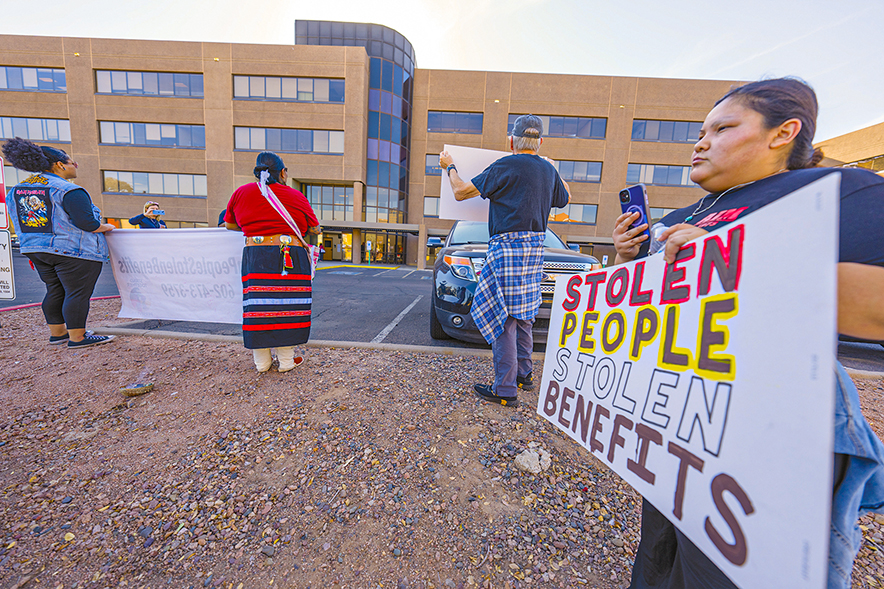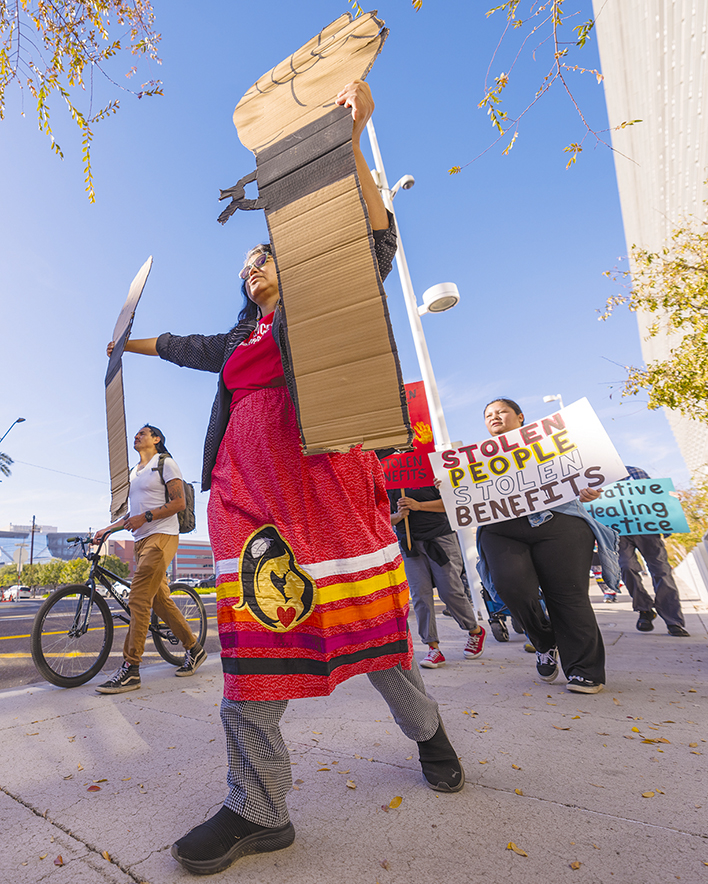
Native advocates demand justice amid substance abuse crisis

Special to the Times | Donovan Quintero
A protector holds a sign outside the Arizona Health Care Cost Containment System building on Dec. 20 in Phoenix.
PHOENIX
For Reeva Stewart, the fight against systemic neglect and exploitation in Native American communities is deeply personal. A mother, advocate, and founder of Turtle Island Women Warriors, Stewart has spent years documenting the tragic outcomes of substance misuse and fraud that have torn through Indigenous families across the country.
Her journey began in 2019 when she noticed an alarming number of missing Indigenous people in her community. What she uncovered was horrifying: many were being trafficked into fraudulent sober living facilities under the guise of addiction treatment, only to be subjected to environments that perpetuated addiction and despair.
“These homes were supposed to help people recover,” Stewart said. “Instead, they fueled the very addictions they claimed to treat. Our people were exploited for profit while the authorities turned a blind eye.”

Special to the Times | Donovan Quintero
Dr. Sofia Marjanovic, from the Fort Peck Sioux Nation, carries cutouts of two hands on Dec. 20 during a protest march in Phoenix.
Among the fraudulent practices was the intentional distribution of drugs and alcohol to residents, trapping them in cycles of dependency. For Stewart, this crisis is more than a public health issue—it is a systemic attack on Native lives.
“It’s a form of genocide,” she said. “Our communities are being torn apart, and it feels like no one is listening.”
Stewart’s advocacy has extended far beyond raising awareness. Through her organization, she has helped hundreds of displaced Indigenous people return to their families, many of whom had been trafficked to these fraudulent facilities from rural reservations. Despite limited resources, she has become a lifeline for many.
“We’ve reunited families and helped people get back home to Montana, Alaska, and elsewhere,” she said. “But there’s so much more to be done.”
Her fight for accountability has led her to government offices and the streets of Phoenix, where she organizes marches to amplify the voices of affected families. She has tirelessly compiled evidence, submitting reports to the FBI and other authorities, but progress has been slow.
“We march for those we’ve lost and for the ones still trapped in these systems,” Stewart said. “We won’t stop until justice is served.”
Catalyst for advocacy
For Mike Damon Bahe, the loss of his brother, Davidson Darren Tso, in January 2023 was the catalyst for his advocacy. Tso went missing, and weeks later, the family learned he had been murdered. Bahe was devastated to discover that law enforcement had known about a confession from the person allegedly responsible but had failed to act in time.
“That’s when I realized we needed advocacy,” Bahe said. “This wasn’t just about my brother. It was happening to others, and no one was stepping up.”
Bahe soon found that his brother’s case was not unique. In the same community, six other families had similar stories of loss and frustration. This was Bahe’s call to action.
“This isn’t just one isolated tragedy,” he said. “It’s a pattern, and it’s happening in our communities.”
Bahe has become a vocal advocate, calling for systemic changes and accountability from tribal and state governments. He criticizes the lack of consistent support from the Navajo Nation, which he says initially showed interest in his brother’s case but later withdrew.
“They should be out here, walking the streets, talking to the people they represent,” he said. “We’re the ones paying their salaries. We’re the ones who voted them in.”
In addition to systemic failures, Bahe points to a broader mental health crisis in Indigenous communities. He believes traditional Diné teachings and practices must be central to addressing these challenges.
“If we could bring back our traditions as a foundation, we could begin to heal,” he said. “Instead of relying on Western approaches, we need to reconnect with our ways of healing.”
Bahe is also focused on empowering youth and addressing the economic hardships that contribute to substance misuse. He recalls programs from the 1980s and 1990s that provided opportunities for children and believes similar efforts could help rebuild the fabric of Indigenous communities.
“It’s not just about throwing money at the problem,” he said. “It’s about time, effort, and bringing back programs that worked.”
Larger crisis affecting Native communities
The stories of Stewart and Bahe are part of a larger crisis affecting Native American communities. A 2023 report from the Substance Abuse and Mental Health Services Administration revealed that Native Americans face disproportionate rates of substance-related emergencies.
Among Native American and Alaska Native populations, the rate of drug-related emergency department visits in 2023 was 935 per 100,000 people, reflecting the widespread impact of substance misuse in Indigenous communities. Alcohol remains a leading factor, with alcohol-related visits among Native Americans occurring at a rate of 480 per 100,000 people, significantly higher than some other racial groups.
The crisis is further complicated by the rise in polysubstance abuse, methamphetamine use, and fentanyl-related emergencies. Geographic isolation, poverty, and systemic neglect exacerbate these challenges, leaving many without access to adequate treatment or prevention programs.
Advocates like Stewart and Bahe argue that addressing these issues requires not just immediate intervention but also long-term systemic change. Stewart continues to demand accountability for fraudulent sober living homes, while Bahe calls for a return to traditional values and community-driven solutions.
“This isn’t just about the past,” Stewart said. “It’s about the future of our communities, the safety of our people, and the dignity we deserve.”
Bahe echoes this sentiment, urging families to stay connected and vigilant.
“We have to look out for one another,” he said. “Know where your loved ones are. Communicate. That’s how we protect each other.”







 Highway 264,
Highway 264, I-40, WB @ Winslow
I-40, WB @ Winslow